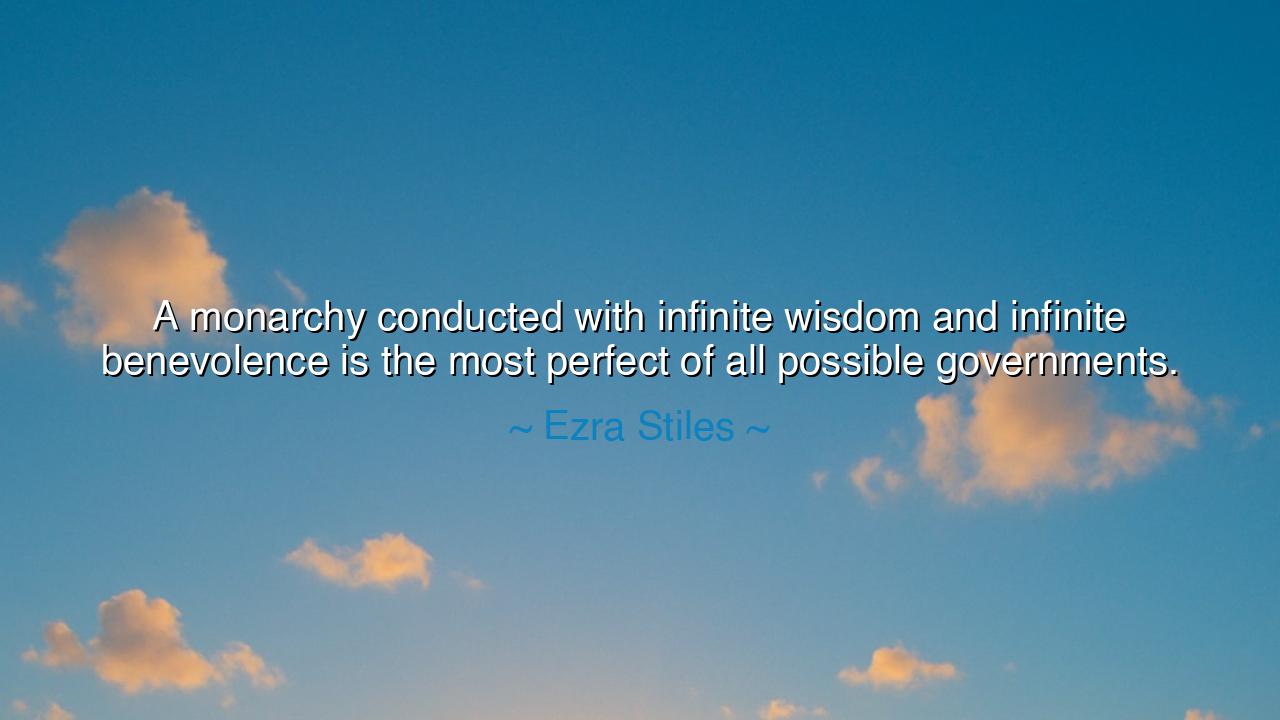
A monarchy conducted with infinite wisdom and infinite
A monarchy conducted with infinite wisdom and infinite benevolence is the most perfect of all possible governments.






Ezra Stiles, the learned president of Yale in the days when America’s destiny was still being written, spoke with measured reflection when he said: “A monarchy conducted with infinite wisdom and infinite benevolence is the most perfect of all possible governments.” In this saying lies both an ideal and a lament. For Stiles recognized that the heart of governance is not in its form alone, but in the spirit of those who rule. A monarchy ruled by true wisdom and pure benevolence would be unmatched in justice, harmony, and peace—yet he also knew how rare such a union is in the kingdoms of men.
The vision is powerful: a sovereign whose wisdom ensures justice, whose foresight prevents strife, and whose benevolence seeks not personal glory but the flourishing of every subject. In such a kingdom, laws would be fair, burdens light, and prosperity abundant. No parliament wrangling, no factions tearing the land, no selfish ambition clouding decisions—only a shepherd-king, guiding his people as a father guides his children. To imagine such a realm is to imagine paradise clothed in royal robes.
History offers glimpses of this dream. Marcus Aurelius, the philosopher-emperor of Rome, sought to embody such rule. His writings in Meditations reveal a soul striving for wisdom, self-control, and service. Though the empire faced war and plague, his benevolence tempered his power, and he sought always to govern with justice. In him, Rome tasted a flicker of Stiles’s perfect monarchy, where authority was wedded to virtue. Yet even Marcus was mortal, and his heirs squandered what he had preserved, showing how fragile such perfection is.
Stiles himself lived in a time when America had cast off the British crown, weary of kings who ruled for self rather than for people. His words carried a double edge: they honored the ideal of monarchy, but in the same breath acknowledged why it so often fails. For infinite wisdom and infinite benevolence belong not to men, but to the Divine. Thus, while monarchy in theory could be most perfect, in practice it falters, for human kings are too often greedy, proud, or blind.
O children of tomorrow, take from this not a call to crowns, but a lesson in the nature of power. Whatever the form of government, let rulers seek wisdom above ambition, and benevolence above selfishness. For the perfection of any state lies not in its structure, but in the virtue of its leaders. And though no man may possess infinity, every leader may strive toward it. To govern with justice and mercy is to approach the ideal Stiles described, and to draw one’s people closer to the peace that all nations desire.






AAdministratorAdministrator
Welcome, honored guests. Please leave a comment, we will respond soon